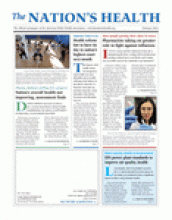Rhode Island has become the first state to stop unnecessarily giving out free infant formula to new moms as they leave the hospital, a practice breastfeeding advocates hope becomes the norm nationwide.
The change was lauded during an event at the Rhode Island State House Nov. 28.
The move is part of an effort to increase breastfeeding rates in the state. Data from 2008 show about 70 percent of mothers in Rhode Island breastfed immediately after childbirth, 38 percent at six months postpartum and about 19 percent at 12 months postpartum, all below Healthy People 2020 goals.
“Getting breastfeeding initiation and maintenance up is tricky, but clearly it’s worth trying to counteract the promotional activities of formula companies,” APHA member and Rhode Island Director of Health Michael Fine, MD, told The Nation’s Health. “Formula is really for women who cannot breastfeed for some reason. I don’t think it was ever meant to be a substitute for breastfeeding. That’s why our ability to do this is so wonderful.”
Research has shown that free formula distribution negatively impacts breastfeeding rates. A study in the September issue of Pediatrics sampled 20 hospitals nationwide and found most still distribute free formula, although the practice is increasingly being eliminated. Rhode Island’s recent victory was possible, in part, because the state is small, Fine said, with seven birthing hospitals.
The achievement is still significant, he said, pointing to the fact that 11,000 babies are delivered in the state each year. Women & Infants Hospital in Providence has a national academic presence and was rated the seventh busiest for obstetrics in the nation, he said.
The elimination of formula giveaways “reflects a sort of different cultural shift that’s beginning to happen in health care,” Fine said. “There is a slow but growing awareness of the influence of people who have something to sell and have distorted the process of health care and made us a wealth extraction system and not a health care system at the end of the day.”
When aggressive formula marketing is coupled with the fact that many women lack a direct breastfeeding role model, Fine said, breastfeeding rates suffer.
“We are not in the place of women with sisters and mothers and cousins around them who breastfed,” Fine said. “Women are often trying to figure this out on their own. And it’s hard. It’s not simple.”
Sue Magee, MD, MPH, director of maternal child health at Memorial Hospital, the state’s most recent hospital to eliminate free formula distribution, said it is especially important for health care providers to send a message that breastfeeding is the healthiest choice for mother and child.
“Unfortunately, I think providers sometimes can make the mistake of saying breastfeeding is easy,” Magee told The Nation’s Health. “Things can tend to get frustrating for most women at some point. I think at some point if there is this can of free formula and they have a crying baby, they might resort to that for feeding their baby. It can get people down the wrong road.”
She said eliminating formula giveaways will benefit mothers, babies and those in the family medicine residency program for Brown University Medical School, which is based at Memorial Hospital.
“The newest clinicians, the people who are still malleable, this is going to be trained in their culture,” Magee said. “I think that is important. We want to have new doctors thinking about these things.”
Rhode Island’s South County Hospital became the first in the state to eliminate free formula distribution as part of becoming a “baby-friendly” hospital in 2000. Such hospitals meet the criteria of the Baby Friendly Hospital Initiative of the World Health Organization and United Nations Children’s Fund to offer an optimal level of care for infant feeding. Other hospitals in the state gradually adopted policies that eliminated industry sponsored formula gift bags, with the last two going “bag free” in October 2011.
“They realized that they were sending the wrong message,” Denise Fenick, RN, IBCLC, chair of the Rhode Island Breastfeeding Coalition, told The Nation’s Health. “If you’re trying to encourage mothers and raise your breastfeeding rates, then you don’t want to be giving out formula and saying, ‘If it becomes hard, turn to this.’”
Fenick said the 20-year-old coalition has had support from the state health department from its inception in working to make Rhode Island a baby-friendly state.
“We have always collaborated,” she said. “They’ve been behind us 100 percent.”
Fine, the state’s health director, said the elimination of free formula distribution is another example of what public health works to accomplish.
“It is the story of our effort to counteract the dangerous and sometimes irresponsible marketing of people with something to sell,” Fine said.
For an article from the American Journal of Public Health on the effects of handing out free formula to new moms, visit http://ajph.aphapublications.org/doi/abs/10.2105/AJPH.2006.103218.
- Copyright The Nation’s Health, American Public Health Association









